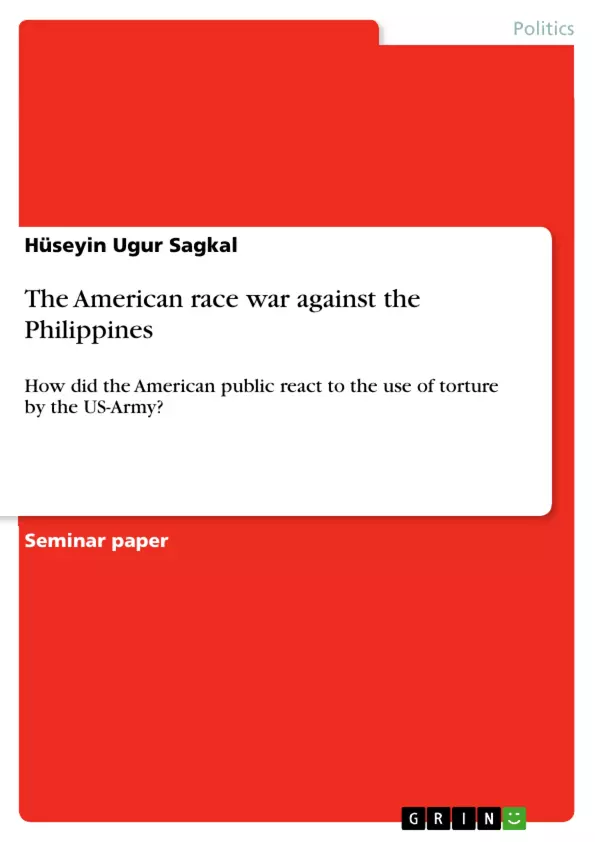This paper aims to analyze the American race war against the Philippines and the excessive use of torture. One of the paper's primary focuses is the American public's reaction and the public debate about war atrocities. The leading question for the paper will be: How did the American public react to the use of torture by the US-Army?
The paper consists of four parts. Firstly, an overview of the conflict itself and how and why torture was conducted during the war will be given. In the second part, the public reaction to torture by the American army during the war will be analyzed. The third part will discuss the aftermath of the Philippine-American War. The last part will conclude the paper.
On July 4, 1902, U.S. President Theodore Roosevelt announced the victory of American troops over the anti-colonial resistance movement in the Philippines. In his keynote address on the 127th Independence Day of the United States, Roosevelt declared the war in the faraway colony before an audience of more than a quarter of a million in Pittsburgh. He informed the public of the offer of a general amnesty to the former enemy. He announced the transfer of political control of the island kingdom to a colonial civil administration.
In particular, the President praised the dedication and conduct of the U.S. troops engaged in the war of conquest. Despite all adversity, Roosevelt said, the army had adhered to the rules of warfare. With a few exceptions, he said, the conduct of the soldiers was governed by sincere compassion and proper respect for the Filipino people and the enemy's troops. The primary purpose of these remarks was to stem the steadily growing criticism of the war from the home front. At the same time, the social controversy over the torture of Filipino prisoners by U.S. soldiers, which had reached its peak in the summer of 1902, was to be ended.
Until today, a controversial public debate about the atrocities of the U.S. Army during the Philippine-American war is still mainly missing.
Inhaltsverzeichnis (Table of Contents)
- Introduction
- Course and Framework of the Philippine War
- The Development into a Race War
- Investigations and Reactions
- Republicans' Counteroffensive against Criticism
- Anglo-Saxonism, American exceptionalism, and racism…….......
- The Emotional Exhaustion of the American Public
- Aftermath
- Conclusion...
Zielsetzung und Themenschwerpunkte (Objectives and Key Themes)
This paper aims to analyze the American race war against the Philippines and the excessive use of torture. The primary focus is on the American public's reaction and the public debate about war atrocities. The main question addressed is: How did the American public react to the use of torture by the US-Army?
- The development of the Philippine-American War as a race war
- The use of torture by the US-Army in the Philippines
- The public reaction to the use of torture in the United States
- The role of Anglo-Saxonism, American exceptionalism, and racism in shaping public opinion
- The aftermath of the Philippine-American War
Zusammenfassung der Kapitel (Chapter Summaries)
The paper begins by providing an overview of the Philippine-American War and the factors leading to the use of torture by American troops. It explores the challenges faced by American soldiers, the role of racial prejudice, and the evolving tactics employed by both sides.
The second chapter focuses on the American public's reaction to the use of torture during the war. It examines the public debate, the influence of political factions, and the evolving public sentiment as reports of atrocities emerged.
The third chapter discusses the aftermath of the Philippine-American War, highlighting the long-term consequences of the conflict and the enduring debate surrounding it.
Schlüsselwörter (Keywords)
The paper explores key concepts such as the Philippine-American War, race war, torture, American public opinion, Anglo-Saxonism, American exceptionalism, and racism. It examines the impact of colonial conflict on American society and the challenges of confronting wartime atrocities.
Frequently Asked Questions
What is the main focus of this paper on the Philippine-American War?
The paper analyzes the American 'race war' against the Philippines, specifically the use of torture and the American public's reaction to these atrocities.
How did Theodore Roosevelt justify the conduct of U.S. troops?
In 1902, Roosevelt praised the dedication of the troops, claiming they adhered to the rules of warfare and showed respect for the Filipino people, despite growing criticism.
What role did 'American exceptionalism' play in the conflict?
The paper examines how concepts like Anglo-Saxonism, American exceptionalism, and racism shaped public opinion and the justification for war atrocities.
Was there a significant public debate about torture at the time?
Yes, the controversy reached its peak in the summer of 1902, though the paper notes that a comprehensive public debate about these atrocities is still largely missing today.
What were the long-term consequences of this 'race war'?
The aftermath section of the thesis discusses the enduring debate surrounding the conflict and its impact on American society and colonial administration.
- Quote paper
- Hüseyin Ugur Sagkal (Author), 2021, The American race war against the Philippines, Munich, GRIN Verlag, https://www.grin.com/document/1151034



